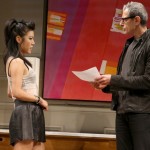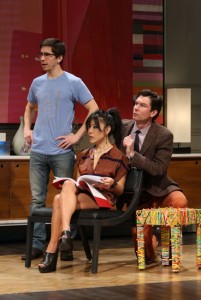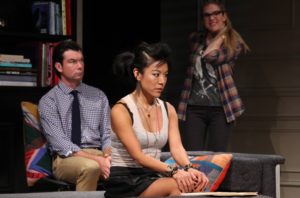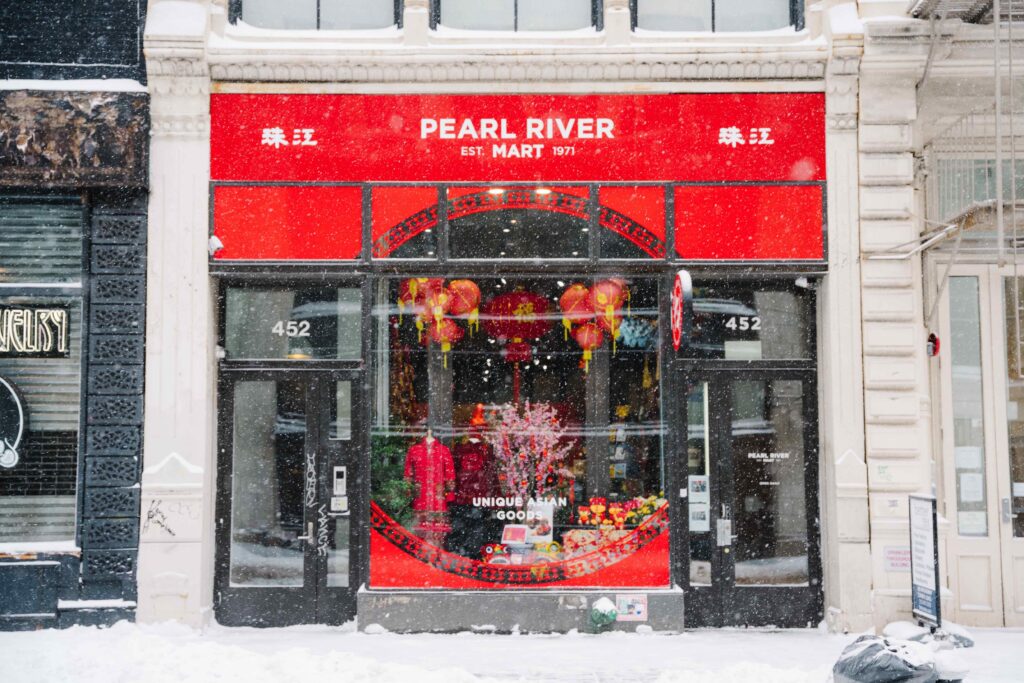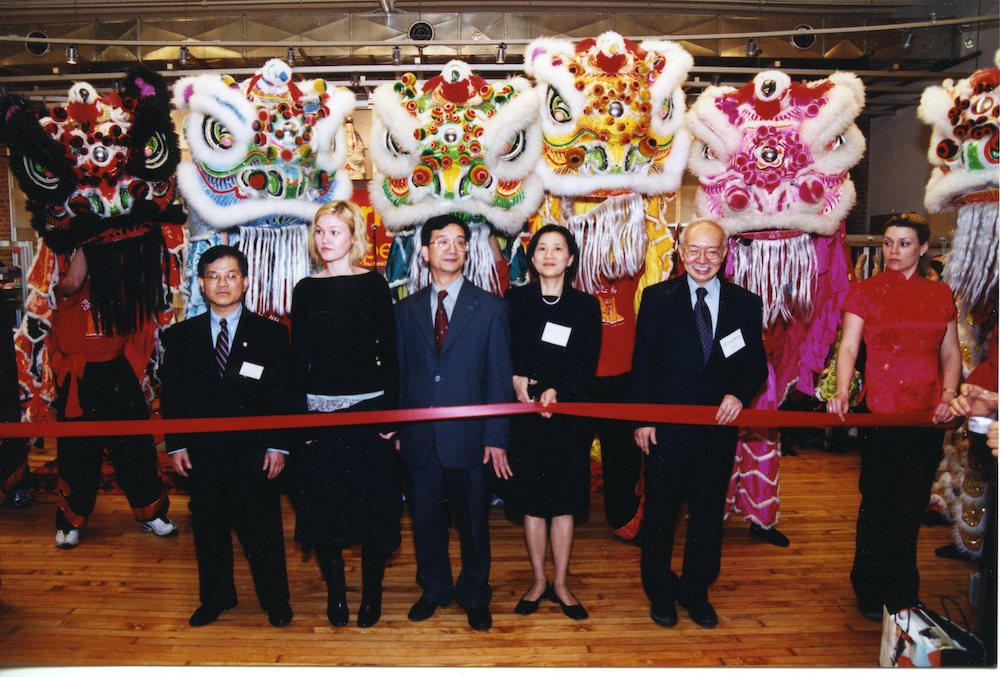“Lifting up my shirt and speaking was a little bit terrifying.”
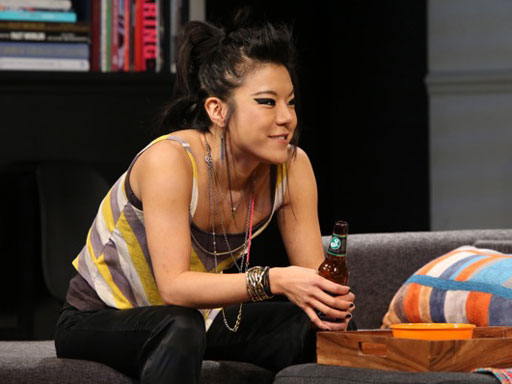
June 19, 2012
Hettienne Park is walking down West 52nd in a black trench coat and boots, pacing a confident, long stride and smoking a cigarette. She has just enough time for early dinner at Danji (overpriced Korean tapas) before her evening performance in Seminar, Theresa Rebeck’s play about four aspiring writers and their teacher in a fiction-writing workshop. The play, with an opening cast that included Tony nominee Alan Rickman, helped the Broadway newcomer earn some stage cred; in May, she took home a Theatre World Award for her Broadway debut (in Seminar) and her off-Broadway debut in Tony Kushner’s The Intelligent Homosexual Guide to Capitalism & Socialism With a Key to the Scriptures. In Seminar, Park played Izzy, a punkish rebel prone to flashing, while in IHo, she portrayed Sooze Moon Marcantonio, daughter-in-law to protagonist Gus, a retired longshoreman and disillusioned leftist on the brink of suicide. It was a huge break for Park—to be cast in a play by Tony- and Pulitzer-winning playwright Tony Kushner—and, in a happy congruence, what prompted her to join the Actors’ Equity labor union. Before Seminar finished its run at the John Golden Theater in May, Park met up to talk about her career, daily shirt-lifting, and why her mother now believes gay people are “just like us.”
—
Open City: I’m curious about the two female characters in Seminar. Some say they’re rather stereotypical or traditional. What do you think of that view?
Hettienne Park: I can see how some people might think it’s traditional in the sense that the women use sex, but when I read the script and when I figured out what Izzy was about, I didn’t really think of it in terms of traditional or nontraditional. She’s a woman who was really clear about what she wanted and how she was gonna get it, and certainly there are women in the world who operate that way. I find Izzy to be really hilarious and admirable in how bold she is, and she’s not shy about it. She’s pretty up-front; she doesn’t try to fool you. You know who she is right from the get-go.
OC: For Izzy, sex is about power and ambition, but also about spontaneity. Watching the play, I was struck by her brazenness—and yours. You’re half-naked! How did you feel about that?
HP: I’ve been completely nude on stage before, but that was different because it was during a transition and it was really dark, and as soon as the lights came up I was under the covers. [In Seminar], lifting up my shirt and speaking for the next however many lines with my shirt still up was a little bit terrifying to begin with… I guess it’s a big deal when you see it, ’cause it’s so unexpected and I can hear the audience gasping. I think it’s really funny. It’s so bold and random and strange, and she just doesn’t give a shit.
OC: I guess it’s a metaphor for the arts—jumping in, doing what you need to do.
HP: Yeah, and she’s like, “This is who I am, and this is my naked self, so deal with it!” Martin’s [another student in the play] biggest problem is he can never get to the truth, and whenever Leonard [the teacher] pushes him to give the truth, he kinda dodges it and shies away from it. He’s terrified to show his writing, afraid of lifting up his shirt, so to speak.
OC: Was the part of Izzy open to actresses of any race?
HP: It was actually calling specifically for an Asian. And I was really so impressed and grateful that [playwright] Theresa Rebeck created this great role for an Asian American.
OC: Wow, I hadn’t realized that. What about your character Sooze in the Kushner play?
HP: My part was for a Korean American female—how is it possible that Tony Kushner wrote this great role for a Korean American? The reality is that there aren’t a lot of roles available for minorities, especially Asian females.
OC: You also starred in Year of the Fish, a play filmed in Chinatown that featured an all-Asian cast—including Ken Leung. But overall, is the industry changing to include more Asian Americans?
HP: I think it is changing, because look at Jeremy Lin—what a hero he is! I totally had Lin fever. I was [at Madison Square Garden] the second time he played, with Alan Rickman sitting next to me. I do think it’s changing. Asian Americans are funny and three-dimensional… and we’re a demographic that earns income, that’s gonna spend money. Hollywood is noticing that—you see more and more Asians on TV.
OC: Tell me about your path as an actress.
HP: I used to wait tables, but I got burned out and fired all the time. I’m a great waitress—I think I’m one of the best waitresses in New York City—but if I get someone who starts treating me like an animal or snaps his fingers or is running me around, I just have a really hard time shutting it off. I would just lose it. And I’d get fired. So then, for a long time, I was a transcriptionist, and I hated it. Eventually I quit transcribing, too. As soon as I quit my job, I was getting residual checks for jobs that I’d done a long time ago, that I’d completely forgotten about. I had overpaid my health insurance, and all of a sudden they were giving me money back. It was paycheck to paycheck, but each time I was about to run out of money, I would get money. It was bizarro. And then I get the phone call for the Kushner play. I couldn’t believe it. And then two months after the Kushner play I got Seminar. I can’t even tell you how many times I’d quit acting, how many times I thought, “I can’t do this, this is craziness!”
OC: That’s unreal. I know it was really hard, but you make it sound easy.
HP: My parents taught me that anything that was worthwhile came with a difficult and treacherous path. But my [Ayurvedic] doctor taught me the exact opposite. It’s hard because you’re expecting it to be hard. What if it was easy? As much as this is hard work, doing a play eight times a week is so easy, going to this thing that I love and enjoy so much.
OC: It does seem fun. I happened to see The Intelligent Homosexual’s Guide with a group of union plumbers in an arts-and-labor program. They were a rough bunch of guys, not your usual theater crowd, but they really enjoyed it.
HP: That’s amazing. I was really excited when my mom came to see it because I don’t think she had ever met a gay person in her entire life, or if she had she didn’t know it. And after she saw the Kushner play, which I thought for sure would go totally over her head because English is not her first language, and because it’s very dense, she was really moved. She was like, “Oh my God, gay people have problems just like we do. They’re just like us.” And I was like, “Holy shit, Tony Kushner opened up my mother’s eyes.”

